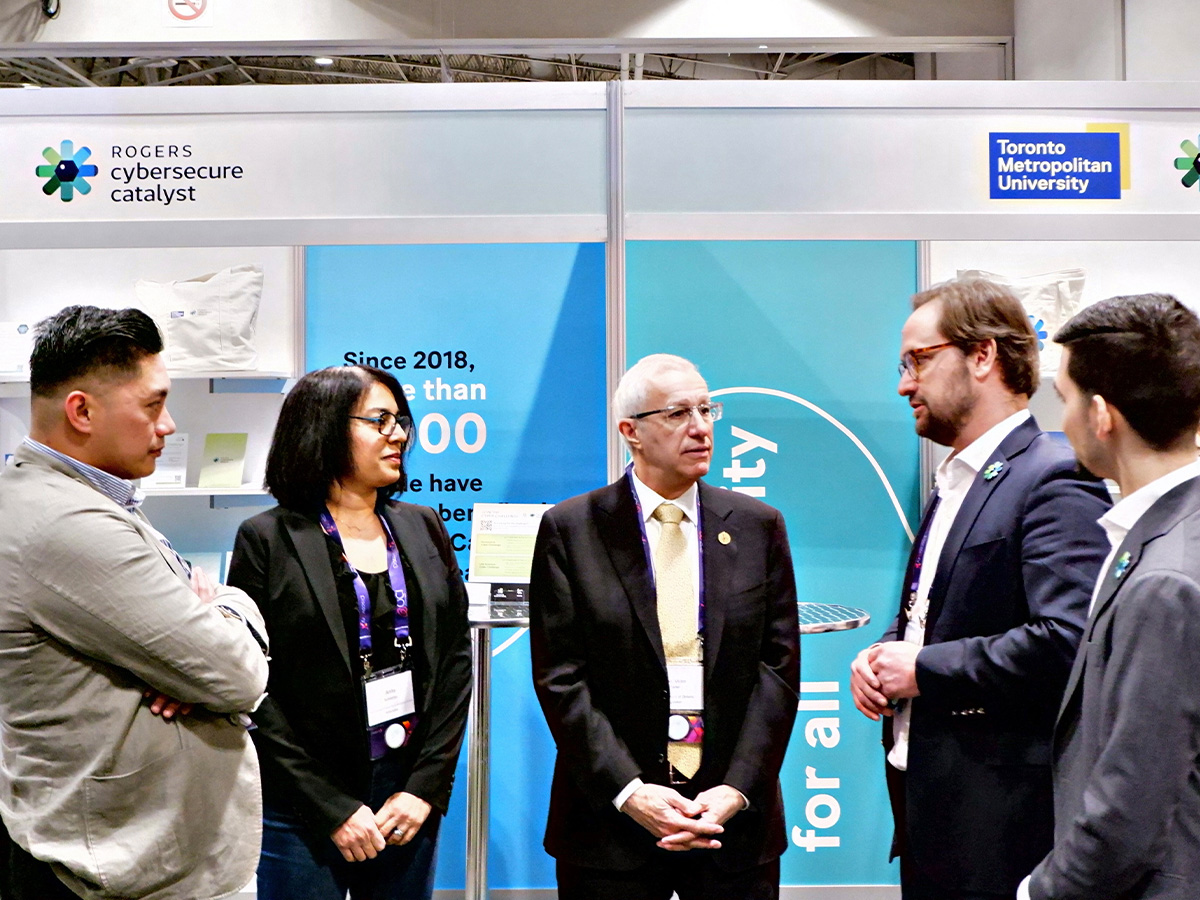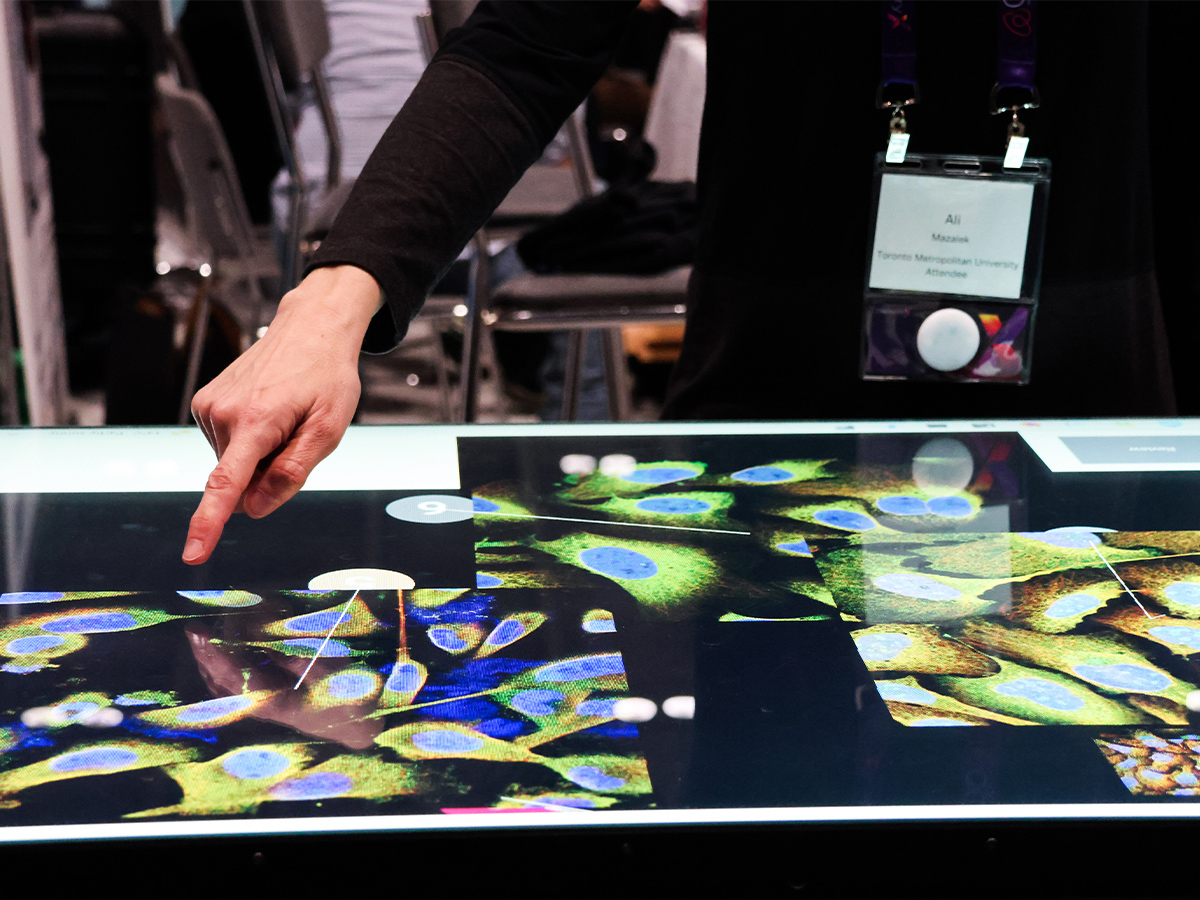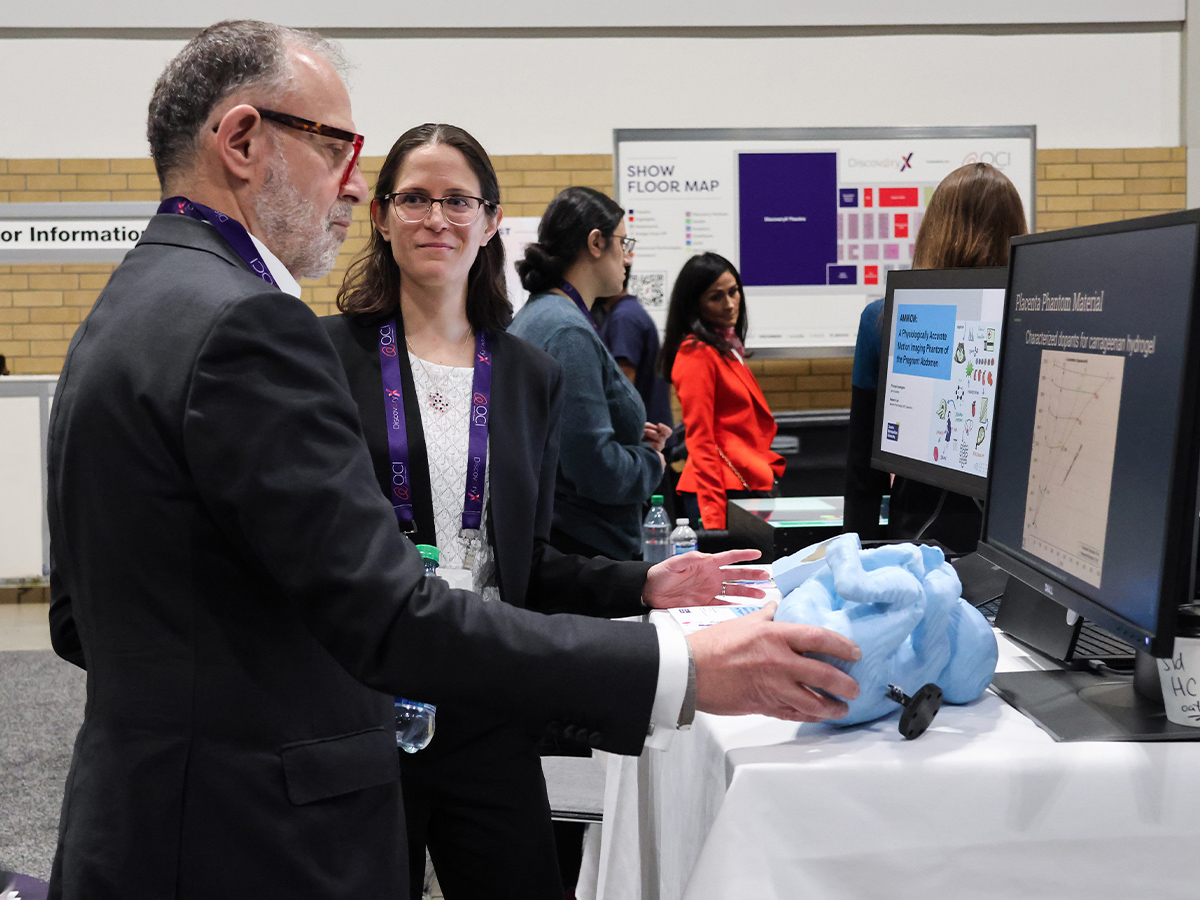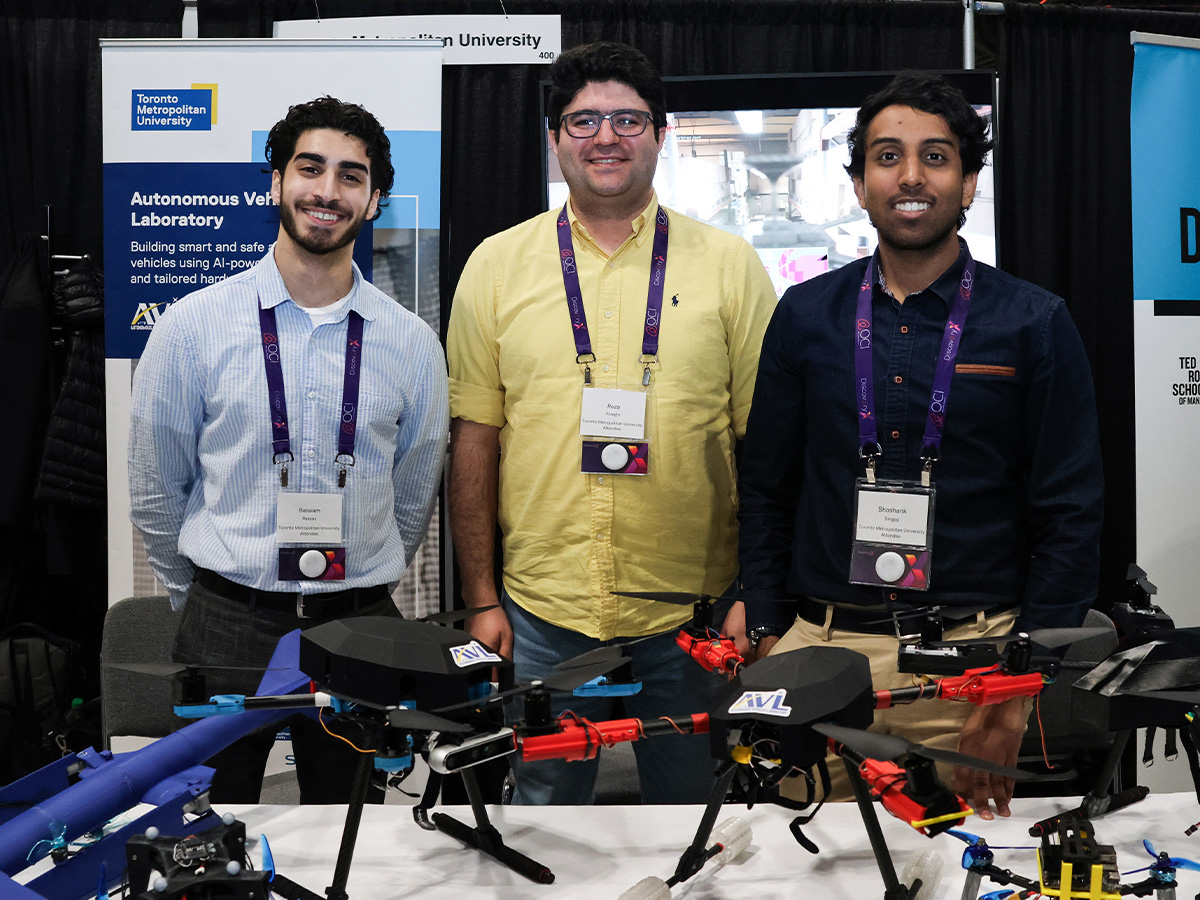Event Recap – TMU researchers showcase technologies at OCI DiscoveryX
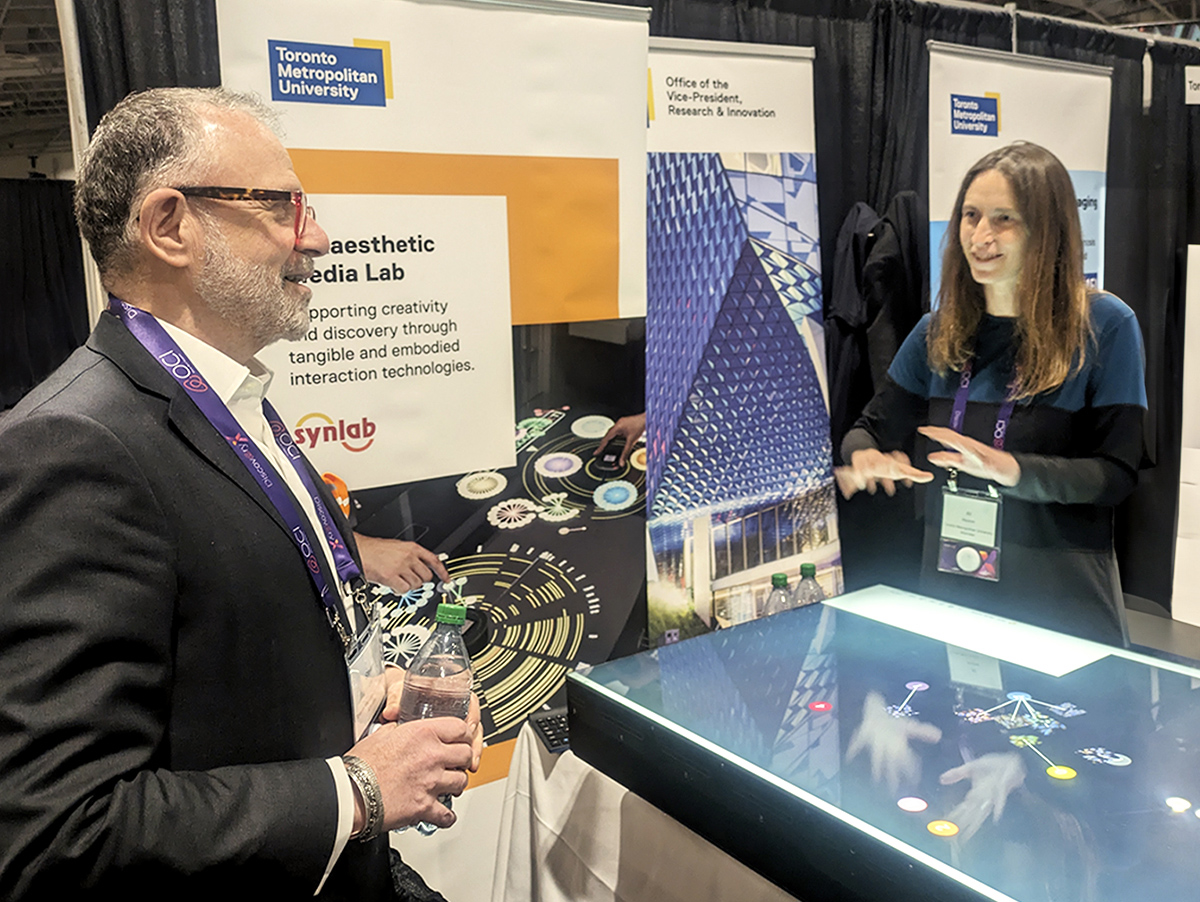
Professor Ali Mazalek (right) gives a demonstration of her technology to Steven N. Liss (left), TMU’s vice president, research and innovation, at the Ontario Centre of Innovation's DiscoveryX conference.
Toronto Metropolitan University’s (TMU) excellence in research and innovation was showcased at the Ontario Centre of Innovation’s DiscoveryX conference at the Enercare Centre last month, where about 2,000 people attended keynote speeches, panels and exhibits.
Among the 250 exhibitors attending April 17 and 18 were TMU researchers and representatives from Rogers Cybersecure Catalyst, the Diversity Institute, the Office of Zone Learning & Strategic Initiatives, Brampton Venture Zone, Lab2Market and The Creative School’s Master of Digital Media program, highlighting the university’s expertise.
Participating TMU faculty included The Creative School professor Ali Mazalek and Faculty of Engineering and Architectural Science professors Dafna Sussman and Reza Faieghi, who demonstrated their leading-edge technologies in machine learning, biomedical innovation and autonomous vehicles.
At the Autonomous Vehicles Laboratory, aerospace engineering professor Reza Faieghi and his students develop technologies and algorithms to enable the safe operations of autonomous vehicles. They brought several different-sized drones to the conference, which were designed and customized at the lab. While the lab focuses on a variety of vehicle types, Faieghi notes drones offer a lot of specific challenges in creating safe autonomous flight – the lessons learned about computing efficiency and environmental perception from the drones can be applied to cars, underwater vehicles and more. “The niche of our lab is we work on software and hardware all together,” he said, adding most research at other labs focuses on one or the other.
The Embodied Machine Learning system developed at professor Ali Mazalek’s Synaesthetic Media Lab (external link, opens in new window) uses a multi-touch tabletop interface to gain experts’ trust while building machine learning models. The system allows data scientists to work with other experts, such as biomedical researchers, to examine data together and manually manipulate and sort it on the tabletop surface. This process brings an expert’s eye to the dataset while promoting collaboration and sensemaking, with AI as an interactive partner at the table. Professor Mazalek, the Canada Research Chair in Digital Media and Innovation, and her team have found the process has helped address human experts’ wariness of machine learning. “We found the domain experts’ trust in the model actually increased a lot when they used our system compared to a just traditional machine learning approach,” she said.
Professor Dafna Sussman’s Maternal Fetal Imaging Laboratory tackles the challenges of creating MRI sequences by creating “phantoms” of a pregnant human abdomen. These physical phantoms – which include everything from synthetic amniotic fluid to a robot that creates movement – are designed to simulate not only anatomy and imaging contrast but also imaging artifacts and physiological motion. “The idea is, once you put them in the MRI, you’ll get the exact same image but also the same imaging challenges,” said professor Sussman. These phantoms help address the logistical issues involved in testing MR imaging techniques, such as the need for a large number of study participants. Her goal in improving fetal MR imaging techniques is to facilitate earlier disease detection and diagnosis to improve health outcomes for parents and newborns.
While at the conference, the Rogers Cybersecure Catalyst announced the new Cyber Challenge (external link, opens in new window) program in collaboration with the Canadian Cyber Threat Exchange. The program will empower technology startups to address cybersecurity challenges in six key Ontario sectors: automotive, life sciences, smart infrastructure, advanced manufacturing, law enforcement and mining.
The Office of Zone Learning & Strategic Initiatives represented TMU’s robust incubator environment at the conference, providing information about TMU’s Zones and partnership opportunities. TMU’s Brampton Venture Zone promoted the BReady Talent Program, while the Lab2Market staff raised awareness of their programs that help innovators launch entrepreneurial enterprises.
The conference offered the opportunity for TMU’s innovators to connect with entrepreneurs, industry leaders and government representatives while demonstrating the university’s research excellence.
